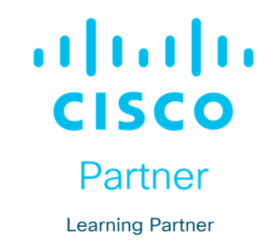Learn how to install, operate, configure, and verify a basic IPv4 and IPv6 network, configure network components, such as switches, routers, and wireless local area network (LAN) controllers (WLNs), manage network devices, and identify basic security threats. This training now also covers the introduction of AI and machine learning (ML) in network operations.
Implementing and Administering Cisco Solutions (CCNA) is an eight-day training program comprising five days of instructor-led training and three days of self-study.
This training prepares you for the Cisco Certified Network Associate (200-301 CCNA) v1.1 exam. If passed, you earn the CCNA certification. This training also earns you 30 Continuing Education (CE) credits towards recertification.
Digital courseware: Cisco provides students with electronic courseware for this course. Students who have a confirmed booking will be sent an email prior to the course start date, with a link to create an account via learningspace.cisco.com before they attend their first day of class. Please note that any electronic courseware or labs will not be available (visible) until the first day of the class.
Exam Vouchers: Cisco exam vouchers are not included in the course fees but can be purchased separately where applicable.

